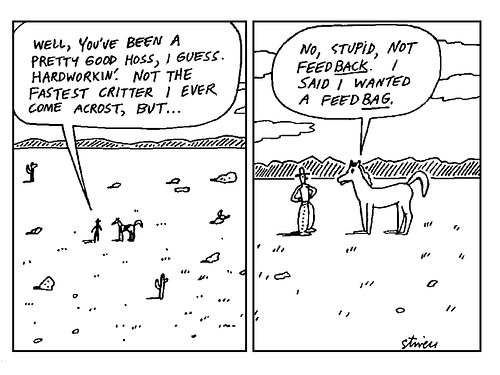It's always something, isn't it?
You change up your daily schedule to make time for writing and then you WRITE and you create something wonderful and you're so excited, but you are a wise writer, a seasoned artist. You know that you need some feedback before you hire a plane and pilot to drop copies of your masterpiece (equipped with adorable little parachutes) over midtown Manhattan so that one will land in the hands of an agent or editor.
You need feedback.
This can be tricky. I know writers who have quit writing because they were so beat up by comments about their work made by people they thought they could trust. That is incredibly sad and I don't want it to happen to you. So here are some handy rules. As always, your mileage will vary.
1. Don't expect honest, useful feedback from someone who loves you or wants to jump into your bed. People like that should only say, "Looks great!" which won't help you, but might keep the relationship intact. I guess if you want to break up with someone, you could ask them to read your manuscript and then exit in a dramatic huff when they give you a crappy critique. That seems a little passive-aggressive to me, but you could always use it as a scene in a future book.
2. Seek out people who read and/or write in the genre that you are writing in. If someone is unfamiliar with or doesn't like your genre, they can't possibly offer you helpful feedback.
3. Adjust your attitude. Assuming you've found a competent, caring person who will give you an honest evaluation of your work, make sure you are emotionally strong enough and in the right frame of mind to receive their feedback. Arguing with that person because she couldn't see any point to chapter ten, or was confused by a character who showed up in the last pages of the book won't help you or your story. Maybe your critiquer is an idiot, but she's entitled to her opinion and you asked for it, so be quiet and listen.
4. Ask for written feedback as well as a conversation. The experience of having your work critiqued can really mess with your head. Your reader might say one slightly hurtful thing and twenty useful, positive things; guess which one thing you'll remember?
5. Don't leap too early. Many writers (me) are so excited in the early chapters of an early draft that they are desperate for someone to read those pages. Resist. This. Urge.
The story is going to change a bazillion times before it's ready to show to an editor. Your critiquer is not going to want to read a bazillion drafts. If you're lucky, she'll read two. Plan accordingly.
6. After you get your written feedback and you reread it, put it and the manuscript away for a while. Start a new project. Take long walks. Give your brain time to ponder the comments. One of the hardest things about writing is learning how to gain enough perspective on your work to be able to evaluate its strengths and weaknesses. You want your emotional reaction to the feedback out of the way before you get back to work on the manuscript.
I have a lot more to say about this, so I think I'll devote two more posts to it. One will talk about the Care and Feeding of Critique Groups and the other will be about how to cope when someone you trusted savages your work. How does that sound? Do you have any other questions about feedback and critiquing? If you can't leave them in the Comments section of this blog (WordPress is acting up again), you can tweet me or leave a note on my Facebook page or Tumblr.
Non-fiction prompt – Make a list of people you think could offer you good feedback. Freewrite about why those folks might work, and why it could turn into a disaster. How would you feel if they asked you to critique something they wrote?
Fiction prompt – Think of a young character, someone between the ages of four and nine. Your character has created a school project or piece of art, writing, or music and has to present it in front of the class. Write about the presentation and how the teacher judges or criticizes or praises the work after the presentation. This could be a nightmare or a wonderful thing for the character – you choose.
Fifteen minutes spent writing today could change your entire life.
scribble…. scribble…. scribble…..





